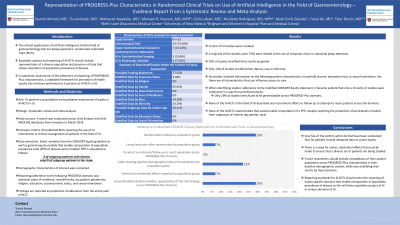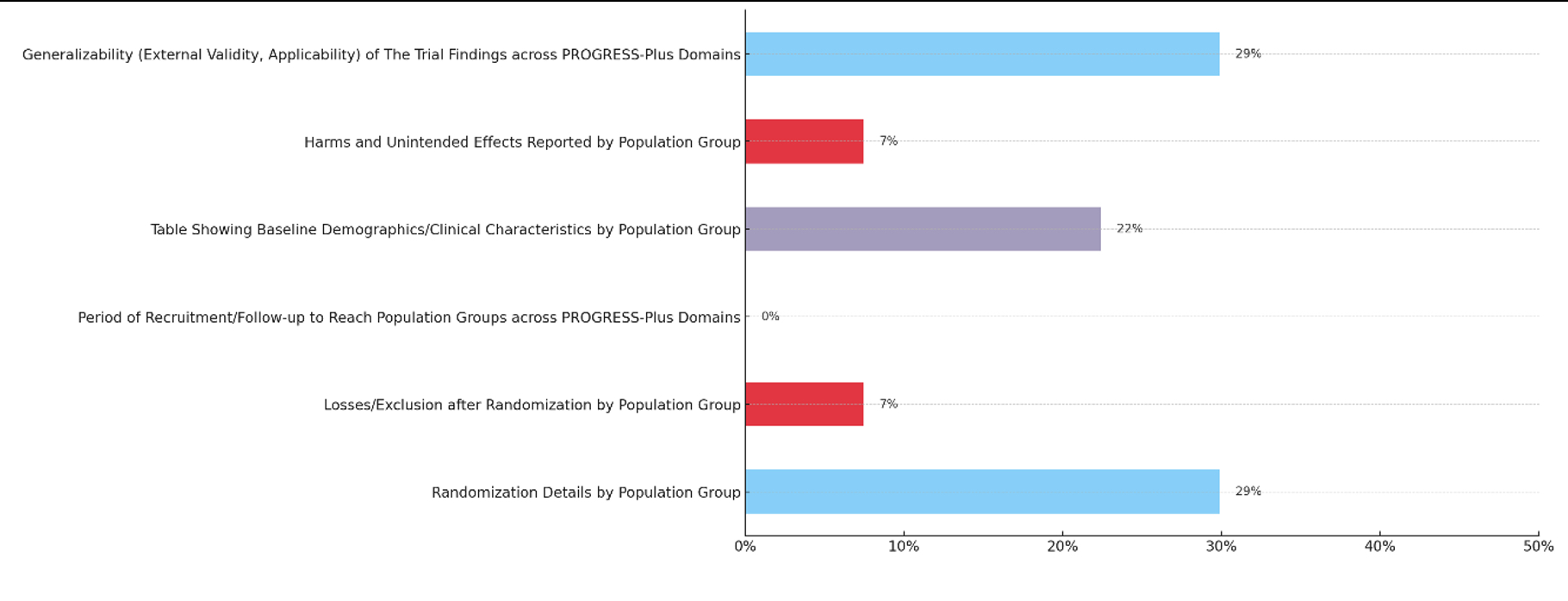Sunday Poster Session
Category: General Endoscopy
P0671 - Representation of PROGRESS-Plus Characteristics in Randomized Clinical Trials on Use of Artificial Intelligence in the Field of Gastroenterology – Evidence Report From a Systematic Review and Meta-Analysis
Sunday, October 27, 2024
3:30 PM - 7:00 PM ET
Location: Exhibit Hall E

Has Audio

Tasnim Ahmed, MD
Beth Israel Deaconess Medical Center, Harvard Medical School
Boston, MA
Presenting Author(s)
Tasnim Ahmed, MD1, Tia Andrade, MD1, Mohanad Awadalla, MD2, Maryam R. Hussain, MD, MPH3, Chris Labaki, MD1, Nicolette J. Rodriguez, MD, MPH4, Mark Enrik Geissler, 1, Faisal Ali, MD5, Tyler M. Berzin, MD1
1Beth Israel Deaconess Medical Center, Harvard Medical School, Boston, MA; 2Beth Israel Deaconess Medical Center, Boston, MA; 3University of New Mexico, Albuquerque, NM; 4Brigham and Women's Hospital, Boston, MA; 5University of Texas, Houston, TX
Introduction: There are many randomized controlled trials (RCTs) on the use of artificial intelligence (AI) in the field of gastroenterology (GI). There has been no systematic analysis of the representation of patients across PROGRESS-Plus characteristics in RCTs investigating AI technologies. Our study aims to address this gap.
Methods: We conducted a systematic review of Ovid Embase and Ovid MEDLINE to identify RCTs on the utility of AI in GI. Data on demographics and AI system used were obtained. We adapted a modified version of the CONSORT-Equity statement and PROGRESS equity domains to assess the equity of AI RCTs. Adherence to these standards was assessed at a trial level. Data are presented descriptively.
Results: A total of 53 RCTs were identified. Of the domains studied, data was stratified by gender in 96%, by race/ethnicity in 14%, and by insurance status in 2% of RCTs (Table). None of the RCTs stratified data by household income, area of residence, education status, or sexual orientation. Although most RCTs included adults aged ≥65 years, only 20% provided subgroup data for the cohort aged ≥65 years. A funding statement was provided by 78% of RCTs. The prevalence of Caucasians was 66% (95%CI 64-68%), Asians was 42% (95%CI 40-43%), Hispanics was 15% (95%CI 13-17%), and Blacks was 9% (95%CI 8-10%). Women made up 51% (95%CI 50-51%) and elderly patients ≥65 years made up 12% (95%CI 10-14%) of the cohorts in studies that reported these values. None of the RCTs provided stratified data to compute population prevalence ratios (PPR; proportion of subgroup with events/total subgroup included in study).
We further assessed equity by studying adherence to the modified CONSORT-Equity statement (Figure); of the 6 domains assessed, the highest reporting was of the randomization process that provided details of equitable value, followed by information on generalizability of RCT findings (29% each). In contrast, information on losses/exclusion after randomization as well as reporting of harms and unintended effects stratified by population groups was the lowest at 7%.
Discussion: AI investigators in the field of GI provide limited details to extract information using the PROGRESS-Plus framework from the conduct of their RCTs; this limits the equitable delivery of AI technology and allocation of resources to improve population health. The lack of data to compute PPR further limits empirical assessment of generalizability. There is an urgent need to address these shortcomings.

Note: The table for this abstract can be viewed in the ePoster Gallery section of the ACG 2024 ePoster Site or in The American Journal of Gastroenterology's abstract supplement issue, both of which will be available starting October 27, 2024.
Disclosures:
Tasnim Ahmed, MD1, Tia Andrade, MD1, Mohanad Awadalla, MD2, Maryam R. Hussain, MD, MPH3, Chris Labaki, MD1, Nicolette J. Rodriguez, MD, MPH4, Mark Enrik Geissler, 1, Faisal Ali, MD5, Tyler M. Berzin, MD1. P0671 - Representation of PROGRESS-Plus Characteristics in Randomized Clinical Trials on Use of Artificial Intelligence in the Field of Gastroenterology – Evidence Report From a Systematic Review and Meta-Analysis, ACG 2024 Annual Scientific Meeting Abstracts. Philadelphia, PA: American College of Gastroenterology.
1Beth Israel Deaconess Medical Center, Harvard Medical School, Boston, MA; 2Beth Israel Deaconess Medical Center, Boston, MA; 3University of New Mexico, Albuquerque, NM; 4Brigham and Women's Hospital, Boston, MA; 5University of Texas, Houston, TX
Introduction: There are many randomized controlled trials (RCTs) on the use of artificial intelligence (AI) in the field of gastroenterology (GI). There has been no systematic analysis of the representation of patients across PROGRESS-Plus characteristics in RCTs investigating AI technologies. Our study aims to address this gap.
Methods: We conducted a systematic review of Ovid Embase and Ovid MEDLINE to identify RCTs on the utility of AI in GI. Data on demographics and AI system used were obtained. We adapted a modified version of the CONSORT-Equity statement and PROGRESS equity domains to assess the equity of AI RCTs. Adherence to these standards was assessed at a trial level. Data are presented descriptively.
Results: A total of 53 RCTs were identified. Of the domains studied, data was stratified by gender in 96%, by race/ethnicity in 14%, and by insurance status in 2% of RCTs (Table). None of the RCTs stratified data by household income, area of residence, education status, or sexual orientation. Although most RCTs included adults aged ≥65 years, only 20% provided subgroup data for the cohort aged ≥65 years. A funding statement was provided by 78% of RCTs. The prevalence of Caucasians was 66% (95%CI 64-68%), Asians was 42% (95%CI 40-43%), Hispanics was 15% (95%CI 13-17%), and Blacks was 9% (95%CI 8-10%). Women made up 51% (95%CI 50-51%) and elderly patients ≥65 years made up 12% (95%CI 10-14%) of the cohorts in studies that reported these values. None of the RCTs provided stratified data to compute population prevalence ratios (PPR; proportion of subgroup with events/total subgroup included in study).
We further assessed equity by studying adherence to the modified CONSORT-Equity statement (Figure); of the 6 domains assessed, the highest reporting was of the randomization process that provided details of equitable value, followed by information on generalizability of RCT findings (29% each). In contrast, information on losses/exclusion after randomization as well as reporting of harms and unintended effects stratified by population groups was the lowest at 7%.
Discussion: AI investigators in the field of GI provide limited details to extract information using the PROGRESS-Plus framework from the conduct of their RCTs; this limits the equitable delivery of AI technology and allocation of resources to improve population health. The lack of data to compute PPR further limits empirical assessment of generalizability. There is an urgent need to address these shortcomings.

Figure: Adherence to Modified CONOSRT-Equity Statement by AI Randomized Control Trials in Gastroenterology
Note: The table for this abstract can be viewed in the ePoster Gallery section of the ACG 2024 ePoster Site or in The American Journal of Gastroenterology's abstract supplement issue, both of which will be available starting October 27, 2024.
Disclosures:
Tasnim Ahmed indicated no relevant financial relationships.
Tia Andrade indicated no relevant financial relationships.
Mohanad Awadalla indicated no relevant financial relationships.
Maryam Hussain indicated no relevant financial relationships.
Chris Labaki indicated no relevant financial relationships.
Nicolette Rodriguez indicated no relevant financial relationships.
Mark Enrik Geissler indicated no relevant financial relationships.
Faisal Ali indicated no relevant financial relationships.
Tyler Berzin: Boston Scientific – Consultant. Magentiq Eye – Consultant. Medtronic – Consultant. RSIP Vision – Consultant. Wision AI – Consultant.
Tasnim Ahmed, MD1, Tia Andrade, MD1, Mohanad Awadalla, MD2, Maryam R. Hussain, MD, MPH3, Chris Labaki, MD1, Nicolette J. Rodriguez, MD, MPH4, Mark Enrik Geissler, 1, Faisal Ali, MD5, Tyler M. Berzin, MD1. P0671 - Representation of PROGRESS-Plus Characteristics in Randomized Clinical Trials on Use of Artificial Intelligence in the Field of Gastroenterology – Evidence Report From a Systematic Review and Meta-Analysis, ACG 2024 Annual Scientific Meeting Abstracts. Philadelphia, PA: American College of Gastroenterology.
